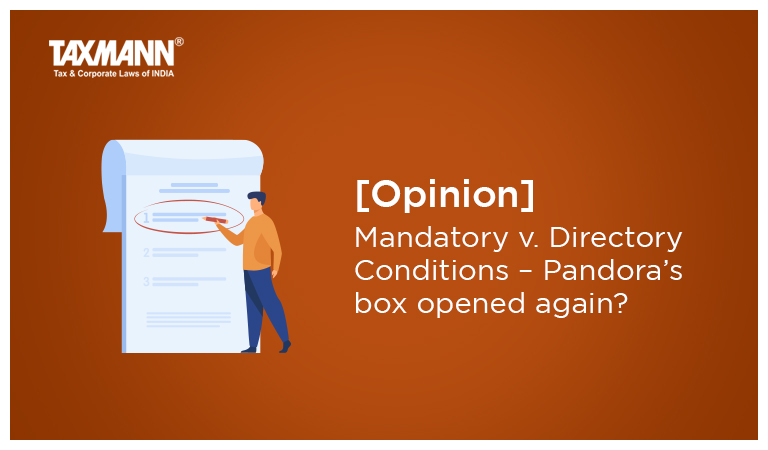[Opinion] Mandatory v. Directory Conditions – Pandora’s box opened again?
- Blog|News|Income Tax|
- 2 Min Read
- By Taxmann
- |
- Last Updated on 3 August, 2022

Bharathi Krishnaprasad & Rahul Jain – [2022] 141 taxmann.com 29 (Article)
The question whether an assessee will be entitled to claim benefits of an exemption if some conditions stipulated under the law are not fulfilled, has been a matter of long-standing debate. While addressing this issue, Courts have time and again applied the prism of categorizing whether the condition under dispute is ‘Mandatory or directory in nature’. In case violation of the former, Courts have denied the benefit and in case of latter, Courts have condoned the violation and granted relief to the assessee.
In this Article, the Author intends to dwell into the basic tenet of what constitutes Mandatory and Directory conditions and the impact of a recent decision of Hon’ble Supreme Court in the case of Wipro Enterprises.
Mandatory v. Directory Requirements
Whether a particular condition is mandatory, or directory can be determined based the effect of non-compliance of such condition.
Provisions which relate to the essence of the thing to be performed or to matters of substance, are mandatory and those which do not relate to the essence and whose compliance is merely a matter of convenience rather than of substance, are directory.
The important distinction between directory and mandatory statutes is that the violation of the former entails no or negligible consequences, while the failure to comply with the requirements of the latter either invalidates purported transactions or subjects the non-complier to affirmative legal liabilities. Although directory provisions are not intended by the legislature to be disregarded, yet the seriousness of non-compliance is not considered so great that liability automatically attaches for failure to comply. The question of compliance remains for judicial determination. If the legislature considers the provisions sufficiently important that exact compliance is required, then the provision is mandatory.
The issue of what constitutes Mandatory and directory conditions was referred to the Larger Bench of the Hon’ble Supreme Court. The Court in the case of Hari Chand Shri Gopal, in the context of claiming of an exemption, laid out the law in respect of fulfilment of conditions for claiming an exemption. The tests in this regard was summarized by the Court as under.
The law is well settled that a person who claims exemption or concession has to establish that he is entitled to that exemption or concession. A provision providing for an exemption, concession or exception, as the case may be, has to be construed strictly with certain exceptions depending upon the settings on which the provision has been placed in the Statute and the object and purpose to be achieved. If exemption is available on complying with certain conditions, the conditions have to be complied with. The mandatory requirements of those conditions must be obeyed or fulfilled exactly, though at times, some latitude can be shown, if there is a failure to comply with some requirements which are directory in nature, the non-compliance of which would not affect the essence or substance of the notification granting exemption.
Click Here To Read The Full Article
Disclaimer: The content/information published on the website is only for general information of the user and shall not be construed as legal advice. While the Taxmann has exercised reasonable efforts to ensure the veracity of information/content published, Taxmann shall be under no liability in any manner whatsoever for incorrect information, if any.

Taxmann Publications has a dedicated in-house Research & Editorial Team. This team consists of a team of Chartered Accountants, Company Secretaries, and Lawyers. This team works under the guidance and supervision of editor-in-chief Mr Rakesh Bhargava.
The Research and Editorial Team is responsible for developing reliable and accurate content for the readers. The team follows the six-sigma approach to achieve the benchmark of zero error in its publications and research platforms. The team ensures that the following publication guidelines are thoroughly followed while developing the content:
- The statutory material is obtained only from the authorized and reliable sources
- All the latest developments in the judicial and legislative fields are covered
- Prepare the analytical write-ups on current, controversial, and important issues to help the readers to understand the concept and its implications
- Every content published by Taxmann is complete, accurate and lucid
- All evidence-based statements are supported with proper reference to Section, Circular No., Notification No. or citations
- The golden rules of grammar, style and consistency are thoroughly followed
- Font and size that’s easy to read and remain consistent across all imprint and digital publications are applied



 CA | CS | CMA
CA | CS | CMA
